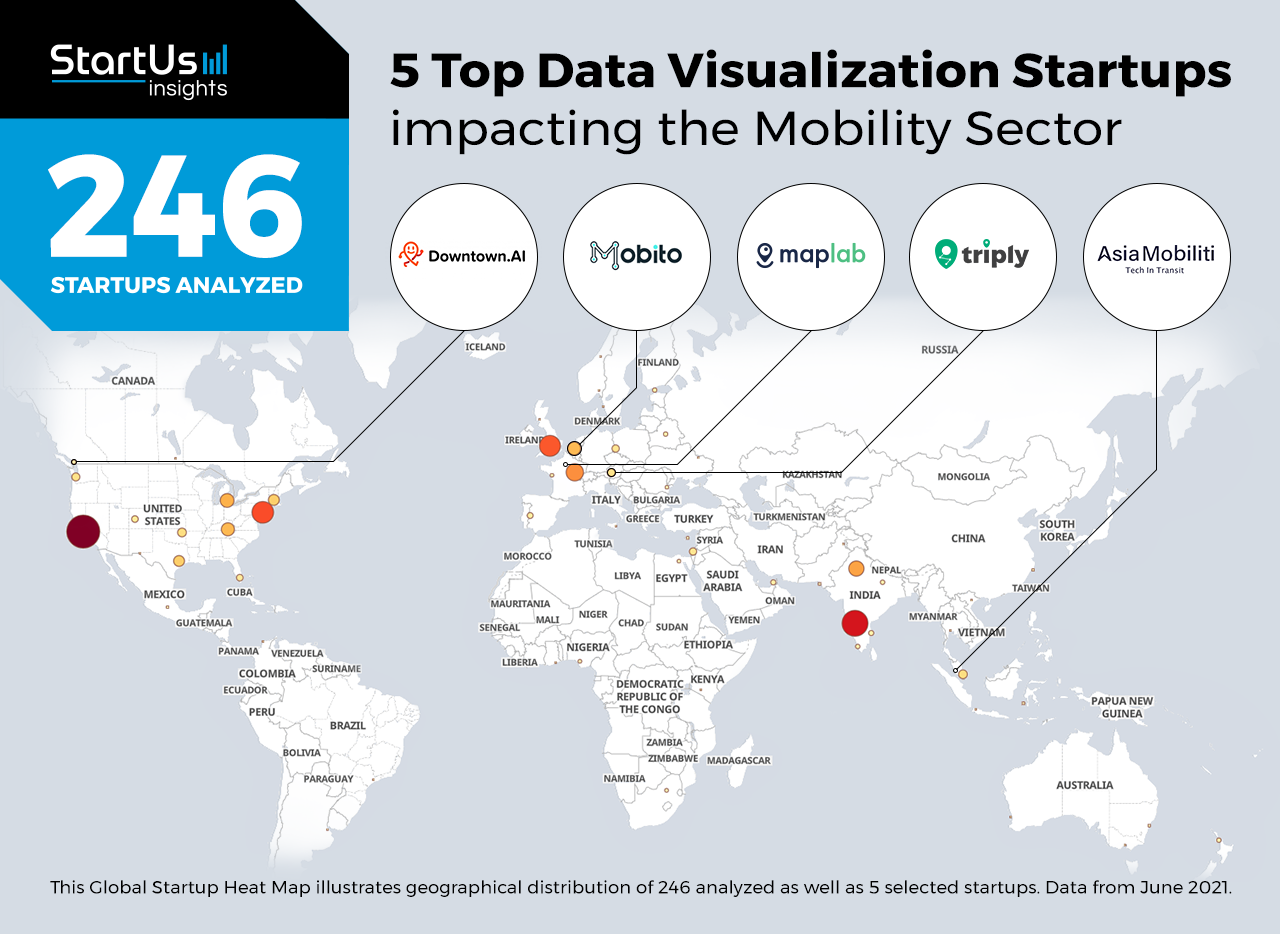Staying ahead of the technology curve means strengthening your competitive advantage. That is why we give you data-driven innovation insights into the mobility industry. This time, you get to discover 5 hand-picked data visualization startups.
Global Startup Heat Map highlights 5 Top Data Visualization Startups out of 246
The insights of this data-driven analysis are derived from the Big Data & Artificial Intelligence-powered StartUs Insights Discovery Platform, covering 2.093.000+ startups & scaleups globally. The platform gives you an exhaustive overview of emerging technologies & relevant startups within a specific field in just a few clicks.
The Global Startup Heat Map below reveals the distribution of the 246 exemplary startups & scaleups we analyzed for this research. Further, it highlights 5 mobility startups that we hand-picked based on criteria such as founding year, location, funding raised, and more. You get to explore the solutions of these 5 startups & scaleups in this report. For insights on the other 241 data visualization startups, get in touch.
Mobito builds a Mobility Data Platform
To ease traffic congestion and make urban transportation more sustainable, cities introduce novel mobility initiatives. However, a lack of tools to precisely quantify the impact of these initiatives limits their wider adoption. To address this, startups develop platforms that integrate and analyze all kinds of mobility data. Moreover, such platforms visualize data in easily interpretable formats to aid in decision-making.
Mobito is a Belgian startup developing a mobility data platform. The City Terminal platform helps cities leverage data visualization and data distribution to analyze the local mobility ecosystems. It features a user-friendly virtual interface to derive actionable insights from mobility data. By visualizing the movement of people and vehicles, it enables the management of road traffic and public transit systems. Moreover, it also monitors air pollution to recommend traffic restrictions that lower pollution.
triply offers Visitor Flow Management
Many cities see a short, massive influx of traffic at certain times. This ranges from visitors of a sporting event to the daily influx of people from nearby cities commuting into the city for work. Consequently, transit operators need to deal with a significantly larger number of passengers in transit than at other times. This is why mobility startups build data tools to help operators to visualize and interpret visitor flow.
Austrian startup triply provides a visitor flow management solution. It estimates and predicts visitors’ routes, providing alternative mobility solutions. This allows operators to effectively deal with a sudden spike in transport demand. The startup also offers a transit management solution that helps public transport networks estimate the effect of any changes on the route, such as construction sites or additional stops.
MapLab visualizes Employee Mobility
Commute contributes to significant stress for a lot of employees, thus hurting productivity. This often leads people to switch from public or company transport to private vehicles. Mobility startups are addressing this gap with data tools that assess the impact of the commute on employees. This advances both sustainable mobility as well as employee satisfaction.
French startup MapLab develops solutions for organizations to track employee mobility. It visualizes and evaluates metrics related to employees’ work-home journey, including travel time and costs, carbon footprint, and impact on health. It also measures the carbon footprint for business trips by providing businesses opt for better travel options. The startup’s solution allows employers to assess the impact of any mobility solution or initiative they take within the organization.
Asia Mobiliti provides Fleet Management Solutions
Both public and private operators seek to optimize routes to serve their customers better while reducing operating costs. Mobility startups and scaleups utilize the Internet of Things (IoT) sensors to track vehicles in a fleet. Data visualization tools map the movement, enabling the identification of potential sites for traffic congestion. Moreover, they allow operators to closely monitor the performance of their vehicles as well as drivers.
Asia Mobiliti is a Malaysian startup offering urban transit intelligence solutions. The startup’s solution, Horizon, uses telematics and the IoT to track each vehicle in a fleet. The IoT device, Orion, records a range of parameters, including passenger occupancy, driving behavior, and cabin conditions. It features a data visualization dashboard to help transit agencies and transport service providers better manage their fleets. The startup also develops Trek, a journey planner app for commuters.
Downtown.AI enables Public Transit Monitoring
Monitoring just the buses in a city does not present a full picture of urban mobility. Mobility startups are turning to solutions that monitor the movement of people across different modes of transport. Visualizing public transit allows public transit operators to predict the presence of different kinds of vehicles on the roads. Further, it drives the development of mobility solutions that cater to multimodal transport.
Canadian startup Downtown.AI enables public transit monitoring for smart mobility. The Software-as-a-Service (SaaS) platform leverages machine learning and big location data to predict human movements in cities. It maps all kinds of movements including pedestrians, cars, public transport, and micro-mobility commutes. This allows public transit networks to accurately predict customer demand and optimize traffic.
Discover more Mobility Startups
Mobility startups such as the examples highlighted in this report focus on connected cars, in-vehicle services, autonomous vehicles as well as shared mobility. While all of these technologies play a major role in advancing the mobility industry, they only represent the tip of the iceberg. To explore more mobility technologies, simply get in touch to let us look into your areas of interest. For a more general overview, you can download our free Mobility Innovation Report to save your time and improve strategic decision-making.









